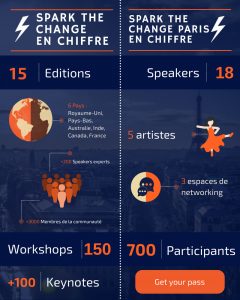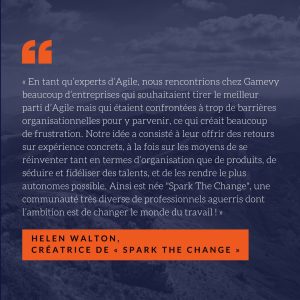
Selon un sondage récent de l’Ifop, 91 % des jeunes cadres français pensent que leur entreprise est en train ou va se transformer. Mais pour 47 % des entreprises, la transformation reste aujourd’hui synonyme de « digitalisation ». Elle ne concerne l’évolution du style de management que dans 21 % d’entre elles et la relation client dans seulement 20 %. Pourtant, ces cadres pensent que la priorité devrait être mise sur l’évolution des modes de rémunération des salariés (37 %), l’évolution des styles de management (33 %) et la formation et le développement de compétences (33 %).
Les jeunes cadres français ont bien compris que loin de se cantonner à la digitalisation des processus, la transformation concerne de nombreux aspects de la vie de l’entreprise, et surtout sa culture et son organisation. « Une entreprise ne peut réussir sa transformation digitale si elle n’a initié une profonde transformation en interne » explique Jean-Christophe Conticello, fondateur et CEO de Wemanity.
« L’apparition d’Internet et des technologies associées a bouleversé en profondeur le monde de l’entreprise. Les modes de consommation ont évolué, le temps s’est accéléré, ce qui a entrainé également une profonde évolution des modes de travail. La nécessité de changer est devenue vitale : on ne compte plus les entreprises qui, en hésitant à changer de recette, n’ont pas réussi à se renouveler et ont disparu : Kodak, Virgin Megastore, Nokia, BlackBerry, Yahoo!, etc. Non seulement, la nouvelle génération a compris cette nécessité de changement, mais elle le suscite avec les nouveaux modes de travail qu’elle privilégie. »
 « Spark the Change » : décrypter et inspirer les bonnes pratiques
« Spark the Change » : décrypter et inspirer les bonnes pratiques 
Pour illustrer et expliquer cette évolution, l’événement « Spark the Change » a été créé à Londres en 2014 par Helen Walton et ses associés de Gamevy, avec le soutien de Wemanity, puis décliné en Australie, aux Pays-Bas, en Inde et au Canada. La première édition française sera organisée à Paris, le 26 juin prochain au Théâtre de la Madeleine.
Centré sur le futur du travail et les moyens de repenser l’entreprise de demain, « Spark the Change » propose aux entreprises françaises un programme de conférences de qualité, basé sur des retours d’expérience.
18 experts se succèderont sur scène pour décrypter les tenants et aboutissants de la transformation des entreprises. Parmi eux : Ludovic Huraux, CEO et fondateur de Shapr ; Dirk Ahlborn, CEO Hyperloop Technology ; Anthony Gooch Galvez, Directeur de la communication et des Affaires publiques à l’OCDE ; Anamita Guha, Product Manager, IBM Watson ; Marianne Syed, Executive Director chez Positive Planet UK. Et bien sûr, Arie Van Bennekum, seul rédacteur européen du Manifeste Agile, aujourd’hui Agile Thought Leader chez Wemanity et Jurgen Appelo, CEO et fondateur d’Agility Scales et expert du management 3.0.
3 thèmes principaux
Animées par des professionnels de toutes nationalités qui souhaitent faire évoluer le monde du travail, les conférences « Spark the Change » sont réparties dans trois sessions principales :

- Créer l’entreprise de demain : les différentes étapes pour insuffler un véritable changement dans l’entreprise, sur la base d’un apprentissage continuel, d’une maîtrise totale des technologies et d’une organisation plus agile et réactive.
Jurgen Appelo, CEO et fondateur d’Agility Scales, expliquera notamment dans quelle mesure il est essentiel pour une entreprise d’aider ses collaborateurs à maîtriser continuellement le changement, par exemple via la ludification et d’autres nouvelles pratiques. - Libérer les talents : développer le potentiel de chaque collaborateur, instaurer le bien-être au travail, booster la collaboration et créer un environnement de travail basé sur la confiance.
Anthony Gooch Galvez, Directeur de la communication et des Affaires publiques à l’OCDE, détaillera ainsi « l’Indicateur du vivre mieux » de l’OCDE qui permet de comprendre ce qui contribue au bien-être des individus et des pays, et d’identifier comment susciter plus de progrès pour tous. - « Sparking disruption » : privilégier l’innovation, voire la disruption ; remettre en cause le statu quo ; et valoriser le progrès social, technologique et culturel.

Dans cette session, Dirk Ahlborn, CEO Hyperloop Technology, dévoilera la genèse de la création d’Hyperloop qui, au-delà des records de vitesse et des nombreuses innovations qui le caractérisent, propose surtout de révolutionner l’expérience des usagers du train.
« Spark the Change a été créé pour inspirer les entreprises, à l’heure où elles sont confrontées à plusieurs évolutions stratégiques : la transformation numérique, l’évolution démographique, la co-innovation voire la “coopétition” sur des marchés mondialisés » explique Sabri Ben Radhia, Responsable de l’événement chez Wemanity. « Si Wemanity était présent lors des premières éditions internationales de Spark the Change en tant que sponsor, nous avons repris la marque et sommes devenus son organisateur principal. Réservé à la fois aux entreprises et aux institutions publiques, l’événement a pour objectif de couvrir l’ensemble des aspects relatifs à la transformation des entreprises, sur la base de très nombreux retours d’expérience. Il vise également à aider les entreprises à développer les compétences nécessaires pour mener à bien leur transformation ».
Le programme de la journée a été construit pour privilégier l’échange d’expériences et le networking. 750 personnes issues de l’ensemble de l’écosystème de l’innovation européen sont attendues le 26 juin prochain au Théâtre de la Madeleine.
Aurons-nous le plaisir de vous compter parmi eux ?
Plus d’information sur l’événement : http://sparkthechange.fr/about-us/
Les experts qui interviendront dans les conférences : http://sparkthechange.fr/speakers/
Inscription : http://sparkthechange.fr/tickets/
Also published on Medium.





